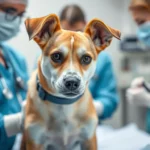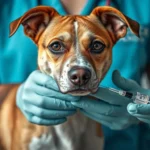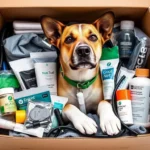
Introduction
Gas in dogs can be a perplexing and uncomfortable issue for both pets and their owners. Many pet owners may find themselves asking, what can you give a dog for gas? Addressing gas issues in dogs is important not only for their comfort but also for their overall health. While occasional gas is normal, excessive flatulence can indicate underlying dietary or health issues that need attention.
In this article, we aim to provide comprehensive guidance on safe remedies and treatments for dog gas, while answering the essential question of what can be done to alleviate this uncomfortable condition for our furry friends.
Understanding Dog Gas
What is Dog Gas?
Dog gas refers to the buildup of excess air or gas in a dog’s digestive system, leading to discomfort and flatulence. This gas is formed primarily through the digestion of food, as well as the swallowing of air during eating or drinking. When a dog’s digestive system breaks down food, gases are naturally produced. However, certain factors can lead to an overproduction of gas, resulting in the need for owners to seek remedies.
Symptoms of Gas in Dogs
Recognizing the symptoms of gas in dogs is key to addressing the issue effectively. Common signs include:
- Bloating: A visibly distended abdomen can indicate excessive gas buildup.
- Foul-smelling flatulence: Not all gas is created equal; if your dog’s gas smells particularly unpleasant, it may warrant further investigation.
- Discomfort or restlessness: Dogs may exhibit signs of discomfort, such as pacing or whining.
- Changes in appetite or behavior: A dog with gas may refuse to eat or exhibit changes in their usual demeanor.
Causes of Gas in Dogs
Understanding the causes of gas can help pet owners take preventive measures. Common causes include:
- Dietary factors:
- Inappropriate foods, such as human food and table scraps, can upset a dog’s digestive system.
- Food intolerances and allergies can lead to increased gas production.
- Eating habits:
- Rapid eating can cause dogs to swallow air, leading to gas buildup.
- Health-related issues:
- Gastrointestinal disorders, infections, or parasites can contribute to excessive gas formation.
Home Remedies for Dog Gas
Dietary Adjustments
One of the first steps in addressing dog gas is to make dietary adjustments. Suggestions include:
- Dog Food Changes:
- Opt for a low-fiber diet to minimize gas production.
-
Consider grain-free options that may be easier for your dog to digest.
-
Incorporating Probiotics:
- Probiotics can improve gut health and reduce gas. Look for probiotic supplements specifically designed for dogs.
Natural Remedies
There are several natural remedies that can help alleviate gas:
- Herbal Remedies:
- Ginger: Known for its digestive benefits, ginger can help reduce gas and bloating. A small amount of ginger can be added to your dog’s food.
-
Peppermint: Peppermint may also aid digestion. A few drops of peppermint oil mixed with food can have a soothing effect.
-
Safe Fruits and Vegetables:
- Pumpkin: Canned pumpkin (not the spiced pie filling) is high in fiber and can help regulate digestion.
- Sweet Potatoes: These are easy on the stomach and can help reduce gas.
Feeding Practices
Implementing better feeding practices can significantly decrease gas production:
- Tips to Slow Down Eating:
-
Use slow feeder bowls or puzzle toys that encourage dogs to eat more slowly, preventing them from swallowing air.
-
Encouraging Hydration:
- Ensure your dog has access to plenty of water, as hydration plays a crucial role in digestion.
Over-the-Counter Treatments
Safe Medications for Gas
There are some over-the-counter (OTC) medications that can be safely administered to dogs for gas relief:
-
Simethicone: This medication works by breaking down gas bubbles in the digestive tract. It is generally considered safe for dogs. Always follow dosing guidelines provided on the package or by your veterinarian.
-
Activated Charcoal: This can help absorb gas in the digestive system. However, it should be used with caution and only after consulting a veterinarian, as it can interfere with other medications.
When to Use OTC Treatments
OTC treatments can be appropriate in certain situations, such as mild gas that does not seem to cause significant discomfort. However, it is always recommended to consult with a veterinarian before administering any medications to ensure they are suitable for your dog’s specific condition.
When to See a Veterinarian
Signs That Require Professional Attention
While many cases of gas can be managed at home, there are times when a veterinarian should be consulted. Signs that require professional attention include:
- Severe or persistent gas symptoms that do not improve with home remedies.
- Accompanying symptoms such as vomiting, diarrhea, or lethargy.
- Changes in behavior or appetite, indicating potential underlying health issues.
Diagnostic Procedures
If you take your dog to the vet for gas issues, they may recommend several diagnostic tests, such as:
- Fecal tests to check for parasites.
- Blood tests to rule out any underlying health problems.
Prevention Tips for Dog Gas
Diet Management
To prevent gas in dogs, it’s essential to manage their diet effectively:
- Implement best practices for long-term dietary choices, such as selecting high-quality dog foods that are appropriate for your dog’s size and breed.
- Gradually transition your dog to new foods to avoid digestive upset.
Regular Vet Check-ups
Regular veterinary visits play a crucial role in preventing gas issues. These check-ups allow for early detection of potential health problems and ensure that your dog is up-to-date on vaccinations and parasite control.
Conclusion
In summary, understanding gas in dogs is essential for effective management. From dietary adjustments and natural remedies to over-the-counter treatments, there are various strategies to alleviate gas issues. However, if symptoms persist or worsen, consulting a veterinarian is crucial for your dog’s well-being.
By being proactive about your dog’s diet and feeding habits, you can significantly reduce the occurrence of gas and improve your pet’s quality of life. Always remember that when in doubt, seeking professional veterinary advice is the best course of action.
Additional Resources
For further reading on dog nutrition and health, consider exploring reputable veterinary websites and guides that focus on canine digestive health. Always consult with local veterinarians or pet nutritionists for tailored advice to your dog’s specific needs.









